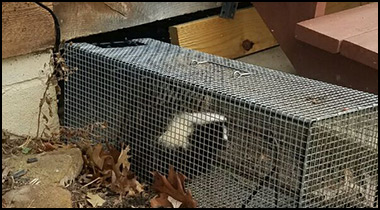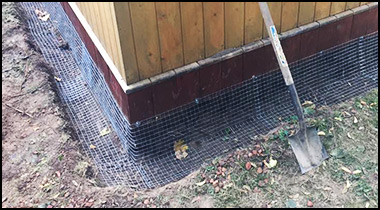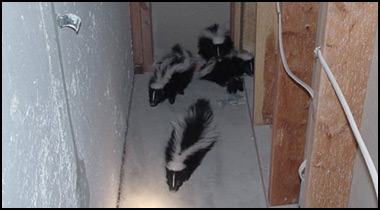Des Moines Skunk Removal Resources
Skunk Rehabber - Iowa Wildlife Center: (515) 233-1379
Free Polk County Animal Services: 515-283-4811
Humane Wildlife Trappers of Des Moines: 515-446-3748
If you need skunk control in Des Moines, you have a few options. First, you can attempt to solve the skunk problem yourself by reading our do-it-yourself guide. If you need outside help, you can also call Polk County Animal Services to see if they have any free resources or help for you - however, they primarily deal with dog and cat concerns. You can also call a local Des Moines wildlife rehabber, as they are typically a great resource for advice that is in the best welfare of the animal. If as a last resort you must hire a professional company, we recommend Humane Wildlife Trappers of Des Moines at 515-446-3748. To learn more about them or check their skunk removal prices, visit desmoinespestanimal.com.

Des Moines Skunk Trapping and Removal

Preventative Repairs & Exclusion

Des Moines Skunk Removal From Structures
In many cases, preventative measures can solve your Des Moines skunk problem - keep garbage secured, pet food indoors, and most of all when it comes to skunks, secure the perimeter of your shed, porch, deck, or house with a barrier - lattice or steel mesh is good, and it keeps Iowa skunks from going under the structure. If trapping and removal of the skunk is the only option you have, please do so with the help of a local agency or professional company who knows how to do it humanely and legally. Browse the resources of this site for more educational information.
Frequently Asked Questions:
Prevention: How to Keep Skunks Away
What to do with a skunk after I catch it?
Is it legal for me to trap a skunk?
How to remove skunk odor
Is a skunk active during the daytime rabid?
What does skunk feces look like?
Des Moines Skunk Control Information: Do skunks run out of smelly spray
Skunks are dangerous and having them in your area is something to be worried of. These crawling creatures that never blink are capable of inflicting serious damages to their victims more specifically the smelly spray of skunk is capable of even killing the person or animal which they spray. Although skunks spray in self-defense, but their sensitive nature make them to use their only weapon as soon as they sense danger. This means even if you will not mean any harm the reptile will still spray.
Good news is that a great majority of skunks is not poisonous, but this doesn't means that you can start playing around with skunks because only few people are capable of differentiating between smelly spraying and non-smelly spraying skunks. Smelly spray production is skunk is an interesting activity in fact smelly spray is considered as saliva, but in highly modified form. It contains zootoxins that help in making the prey immobile and also its digestion is simplified. Not only this, protection against threats is also provided. Normally skunks inject their smelly spray using fangs after biting, but there are also species present that spit.
Glands which are responsible for secretion of zootoxins serve as modification of parotid glands that are also present in other animals. These glands have larger alveoli where the smelly spray is stored prior to conveying it to a duct so that it can be sent to fangs for injection. Smelly spray is made up of 20 plus compounds that have protein nature. Do skunks run out of smelly spray? This is one of those questions, which often come in minds of people. We have discussed above that smelly spray of skunk is actually saliva in a modified form so just as saliva never runs out similarly a skunk will never run out of its smelly spray.
In humans sometimes mouth is dried or the production of saliva is reduced. Same can happen with skunks, but this never means that skunk gets depleted of its smelly spray reserves. It will make more as long as it lives. As mentioned earlier smelly spray is a part of defense system of skunks. In fact, it is the only weapon they have against their predators they don't have limbs so driving away predators otherwise would have been extremely difficult.
In all cases you must try to avoid any kind of interaction with skunks because an encounter can make difference between life and death so it is better to be on safe side.
Remember, for free services you can try (515) 233-1379 or 515-283-4811, but if you need to pay for professional help, check the prices at the desmoinespestanimal.com website. Or follow our do-it-yourself guide!

